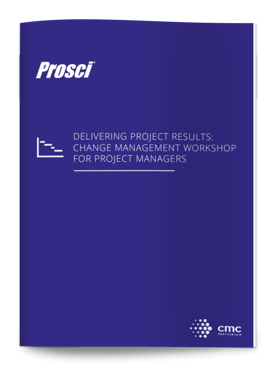Starting any project without considering the integration of change management will not optimise the business results you should expect. With change management moving into the mainstream, project management and change management now go hand in hand in leading organisations who need to both increase their change capacity and the incremental business performance they drive from each change they undertake. Delivering new capabilities on time and on budget is no longer enough, changes must be fully adopted too.
Although entirely distinct disciplines, each with their own tools and processes, change management and project/programme management are increasingly integrated. According to Prosci’s best practice research 58% of those who integrated change management and project management in their project met or exceeded their project goals compared to the 42% who did not. The disconnect between these two approaches is cited as one of the biggest obstacles for leading successful change.
To learn more about the value of project and change management integration, we recommend clicking here to read one of our previous blogs., or consider participation in our next 1-day Delivering Project Results workshop, details below.
This particular blog post addresses the 3 common areas that project management and change management share and looks at how these commonalities help to unify the approaches, allowing organisations to achieve both their desired change and project results.
1. Results-orientated
Both disciplines revolve around achieving results to improve the performance of the organisation- although they may have different approaches of doing this. To reach these results both rely on different metrics and measurements to gauge their successes. Common project management success measures include adherence to the project timeline and scope, achieving the project’s technical KPIs (e.g. functionality) and delivering on or under budget; these objectives are more technical in their focus. Conversely, to assess change management results we measure employees' speed of adoption in the new way of working, the proficiency of those employees in the required new way of working and ultimately how many impacted employees successfully make the transition to the new way of working out of the total target employee population.
These measures of project and change success often have different owners in one organisation compared with the next based upon the traditional governance history and the responsbility structures in place. Sometimes the project team will own both technical and adoption KPI achievement and sometimes they will only own the delivery of technical KPIs. Having clear accountability and a shared understanding as to who owns what is critical for successful change adoption and business result delivery.
2. Process driven
Another commonality is that both approaches follow structured processes and proven methodologies that guide management through the project lifecycle or the change process. These step-by-step chosen processes help to drive their overall actions and keep the change and/or project on the right track to provide a set of deliverables either to the people side of change and/or to the technical side of change.
Both disciplines also take advantage of different tools that will help to reach their desired outcomes. For instance, popular project management tools take the form of resource plans, RAID logs, RACI matrices, Gantt charts etc. Common change management activities are included in communications plans, sponsor roadmaps, resistance management plans, coaching plans for middle managers etc. There will be overlap in the names of these tools e.g. in training or communications plans, but while they appear to have a similar function the focus of a training plan will be different from a project viewpoint than from a change adoption viewpoint. Nevertheless the plan can and should incorporate both dimensions where possible. Progress reporting on action delivery from each plan should also be synchronized and not separated.
3. Require skilled practitioners
Whether they be external or internal, project management and change management demand skilled and trained practitioners to be at the helm of the change/project. Due to the complexity of change and the level of responsibility and skill involved, it is recommended to hire a trained professional or provide training for your change management practitioners/project managers.
There may be some cross-over on some of their skills and responsibilities, but they do require a vast amount of knowledge and expertise in their respective fields in order to achieve their goals. Change management practitioners need the skills to help the organisation during transition periods, mitigate change resistance, encourage and support preferred senders to effctively communicate change progress and increase change adoption and sustainability. Project managers need the skills to effectively design, build and deliver new capabilities on time and on budget.
Today, project managers and change management practitioners face increasing pressure to skill-up due to the digital transformation economy that we now live in; making their jobs more complex. At CMC we understand the importance of having skilled change management practitioners working collaboratively with great project managers. We provide a range of role-based Prosci change management training courses and workshops for people looking to become change management practitioners or for already-certified Prosci change management practitioners as well as project managers.
Which category do you fall under?
1. Are you looking to become a certified change management practitioner? Take a look at our Prosci Change Management Practitioner Certification Programme.

2. Are you already a certified Prosci change management practitioner but need to update your learning? Take a look at our Prosci Change Management Refresher workshop.
3. Are you a project manager taking on the responsibility for change adoption as well? Then our Prosci Delivering Project Results Workshop is the one for you.
You may also be interested in…

Free Brochure: Prosci Delivering Project Results
Learn more about Prosci Delivering Project Results workshop, what you will learn, why you should attend, and what materials you will gain from attendance with our brochure here.





